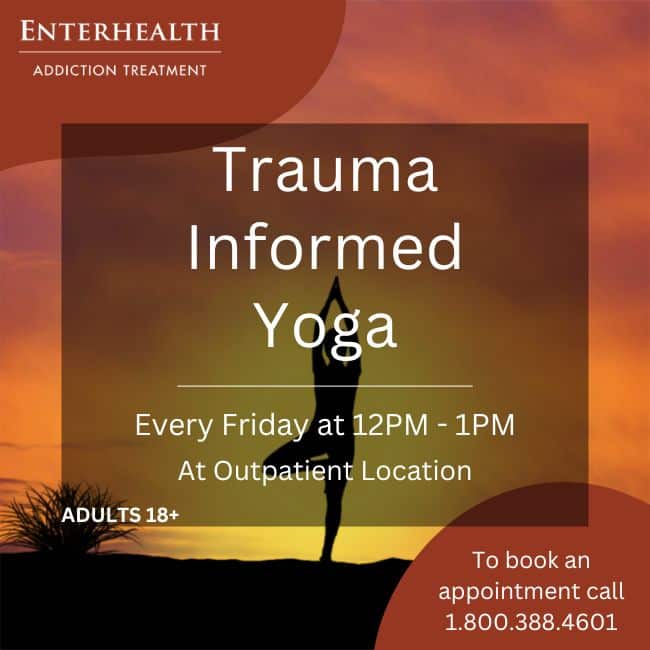Addiction is, unfortunately, a common response to trauma. Many people turn to drugs and/or alcohol to numb the pain or as a coping mechanism. Trauma informed yoga can help by providing a safe and supportive space to explore emotions and begin the process of healing.
Trauma informed yoga is different from other types of yoga in that the emphasis is on making students feel safe and giving them choices about how to execute their poses, addressing the unique needs of trauma survivors.
Trauma informed yoga uses a combination of breathwork, mindfulness, and gentle movements to help the body and mind heal. Focusing on the breath can help participants regulate their nervous system, and peaceful movements can help release tension from the body. The mindfulness component can guide individuals to become more aware of their thoughts and emotions, which can be helpful in managing trauma symptoms.

What Are the Benefits of Trauma Informed Yoga?
Calming the nervous system – The nervous system has two settings: sympathetic, or “flight or fight” and parasympathetic, or “rest and digest.” People who go through serious traumatic events often find themselves stuck in the sympathetic “flight or fight” mode. This means that they feel stressed much of the time, and it is difficult for them to unwind. Trauma informed yoga is particularly useful for soothing the nervous system of those who have experienced trauma.
Improving mind-body connection – People who have experienced trauma often do not feel safe in their own bodies. This means that they sometimes disassociate, particularly when they are in stressful situations. Trauma informed yoga restores the mind-body connection, helping trauma survivors enjoy being in their bodies again while reducing incidences of disassociation.
Teaching participants to remain in the present – Trauma survivors have a tendency to replay past traumas on a loop or worry about the future. Trauma informed yoga helps break this cycle by encouraging participants to focus on their bodies and their breathing.
Helping people learn their limits – Trauma informed yoga helps students identify and stay within their “window of tolerance.” This is where they are not over-activated (which can result in flashbacks or panic) and not under-activated (which leads to less awareness).
Yoga Benefits for Recovery & Mental Health
Yoga and meditation can serve as healthy solutions to addiction thanks to the way they address the problem from the inside out, replacing emotional turmoil with inner peace. This provides another path to find peace and inner satisfaction that replaces the addiction. Yoga is a rehabilitation assistance program proven to restore health and educate those in recovery about their bodies and state of mind.
Different Types of Yoga
Yin Yoga
Yin Yoga is a style of Yoga that is therapeutic for the body and mind. Yin Yoga involves gentle movements and stretches, making it suitable for those in recovery. It primarily targets connective tissue in the hips, pelvis and lower spine to release toxins and help connect the mind and body.
Stress creates tension in the body. In Yin yoga, participants touch what is happening in their bodies, hearts, and minds, remaining in the postures anywhere from 1 – 5 minutes. The practice has been shown to help with physical, emotional, and mental health, as well as overall well-being.
Kundalini Yoga
Kundalini incorporates postures and breathing exercises that reduce stress, release toxins, and strengthens the nervous system and brain.
Yoga for balance
Involves yoga poses specifically designed to increase brain strength and improve the ability to focus.
Guided Mindfulness Meditation
Mindfulness is a way of focusing the mind on the present moment and paying attention to yourself, others and the world around you. It’s proven to help with stress, anxiety, depression, and addictive behaviors, plus it has positive effects on physical problems like hypertension, heart disease and chronic pain.
Contact Enterhealth Today for More Information
Trauma informed yoga is just one more tool that Enterhealth is proud to offer our patients. Our goal is to not only provide treatment for a lifetime, but also offer a variety of innovative therapies and practices that help people in all aspects – physical, mental, emotional, and spiritual.
If you or a loved one need help dealing with a traumatic experience, substance use disorder, or other mental health conditions, our inpatient, outpatient, and continuing care programs also offer a comprehensive suite of therapy and counseling services – including individual, group, family, and couples counseling and treatment.
Reach out to us today and one of our intake professionals will answer any questions you might have help you determine the best option(s) for treatment.




